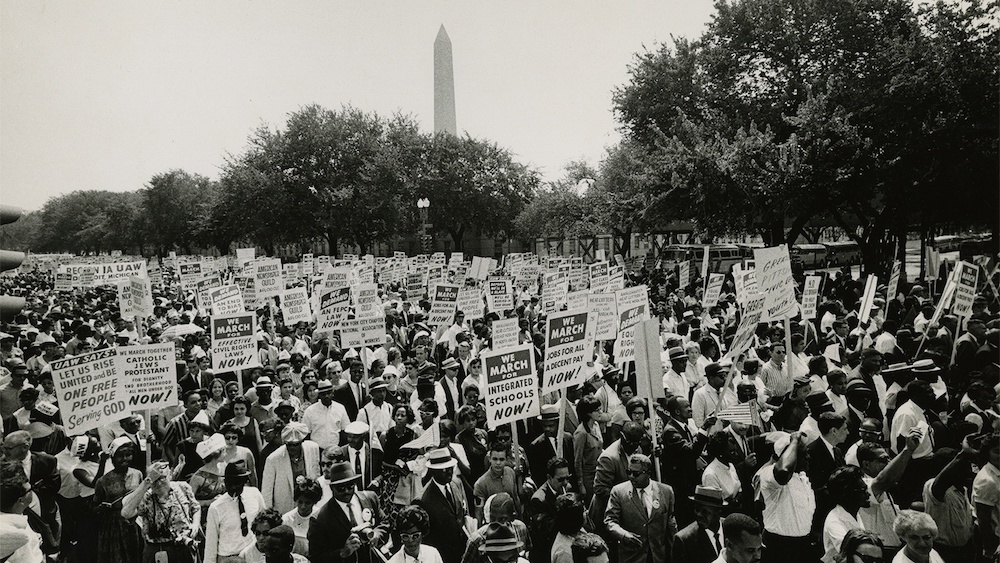If you’re interested in sharing your opinion on any cultural, political or personal topic, create an account here and check out our how-to post to learn more.
Opinions are the writer’s own and not those of Blavity's.
____
For decades, labor unions have been critical allies to the Black community in the fight for freedom, justice and respect in this country.
However, it wasn’t always that way.
In the late 1800s and early 1900s, many labor unions either banned Black workers from membership or segregated workers by race, resulting in the creation of Black unions such as the Colored National Labor Union, founded in 1869 and led by Isaac Meyers and Frederick Douglass, and the Brotherhood of Sleeping Car Porters, founded in 1925 and led by A. Philip Randolph.
These new Black union leaders helped pave the way for progress toward racial and economic justice in America. In the 1940s and 1950s, Black union leaders such as Randolph and E.D. Nixon played pivotal roles in ending segregation in particular industries, the military and large cities. As they made progress, they also made allies within the union movement. In 1963, Randolph and organizer Bayard Rustin joined forces with a coalition of civil rights organizations, religious groups and labor unions, most notably the United Auto Workers, in orchestrating one of the most famous civil rights demonstrations in American history — the March on Washington for Jobs and Freedom, where Dr. Martin Luther King Jr. gave his “I Have a Dream” speech.
But the connection between Dr. King’s work on civil rights and union issues didn’t end in Washington. Indeed, on the eve of Dr. King’s assassination, he gave his famed “I’ve Been to the Mountaintop” speech to a group of Black sanitation workers whose strike for higher wages and better working conditions he was there to support.
Since the days of the Civil Rights Movement, labor has continued to advocate for equal rights for all people. Last summer, labor supported the Black Lives Matter movement and joined the call for our political leadership to seriously address how systemic racism plagues our justice system, our workplaces and our country.
While great strides have been made in the struggle for racial and economic justice in this country, there is still much work to be done to achieve dignity and justice for all.
One way every working American can support that struggle is to join or form a union at your workplace, and here’s why:
Collective Power
We’ve all heard the phrase “there is power in numbers” and that is the very foundation of a union. Building worker power in numbers.
In a union, workers collectively band together to demand dignity and fairness in the workplace. A company can get away with ignoring one or two workers’ concerns, but when dozens of employees join together and support each other, the company has no choice but to listen.
For decades, Black workers have stood against injustices in the workplace. We have collectively used our voices to call out systemic racism and highlight the lack of Black leaders in our companies and elected officials. By joining together with our coworkers, we can help lead the fight to end systemic racism.
Higher Wages and Better Benefits
The top reasons why most workers join a union are to earn higher wages and earn better benefits.
We know this country was built on the exploitation of Black labor, and, for decades, unions have fought for racial pay parity in this country. In 2020, unionized Black workers earned median wages 27.4% higher than non-union Black workers.
However, the average wages of unionized Black workers still fall below the median earnings of non-unionized white workers — which highlights the need for unions even more. Under a union contract, workers are guaranteed to be paid equally for equal work, without respect to race.
Unionized workers are also more likely to have employer-provided health insurance and a secure retirement such as a pension or an employer-matched 401(k) plan. Unionized workers are also often able to negotiate more paid sick and vacation time.
Advocacy on Capitol Hill
Union membership gives workers direct access to their elected officials. In addition to advocating for worker-friendly initiatives such as increasing the minimum wage and lowering health care premiums, unions also voice worker concerns to elected leaders and their staff.
For example, in July 2020, my union, the American Federation of Government Employees, surveyed members regarding racism at the Department of Veterans Affairs. Following the published results of the survey, multiple members of Congress were alerted to the situation and two senators called for an investigation.
This wouldn’t have happened if union members didn’t stand up and report the injustices they face regularly in the workplace, knowing their fellow union members would have their back.
Strengthening Our Communities
There is no doubt about why Black workers have continued to have a higher membership rate than white workers (10.7%), Hispanic workers (9.8%) and Asian workers (8.9%). For decades, unions have given us the ability to pool our power and demand higher pay and benefits than we would ever receive in a non-union workplace.
There is a reason why public sector employees, teachers, first responders and sanitation workers are heavily unionized. For generations, these jobs have sustained Black communities across the country.
Unions provide Black workers a seat at the table and give us a platform to speak on our issues. Dr. King cemented the proud relationship between labor unions and civil rights at the March on Washington in 1963. And I was proud to speak at the 57th Anniversary of the March on Washington, where I affirmed AFGE’s stance in the continuing fight for fairness and racial justice.
As a Black man from Alabama, I wouldn’t have been given that opportunity if I hadn’t joined my union back in 1981.
____
Dr. Everett Kelley is the National President of the American Federation of Government Employees, AFL-CIO, the largest union representing federal and D.C. government employees.
